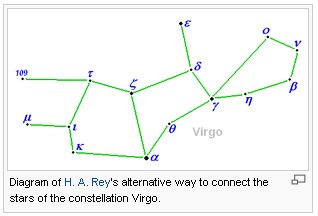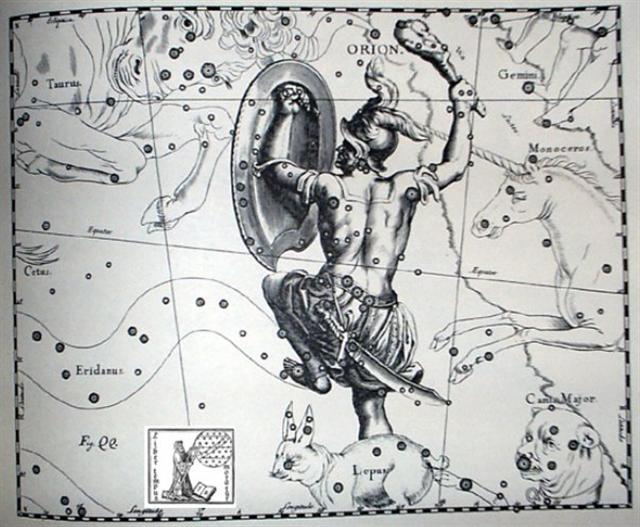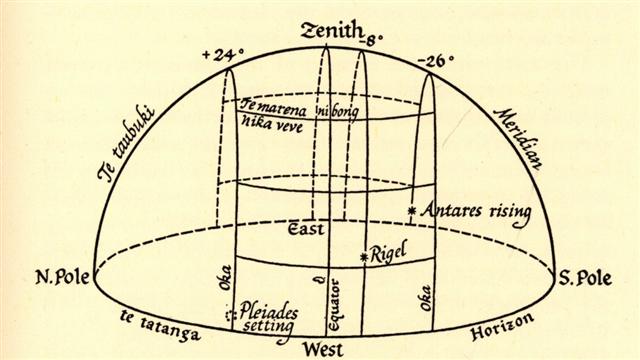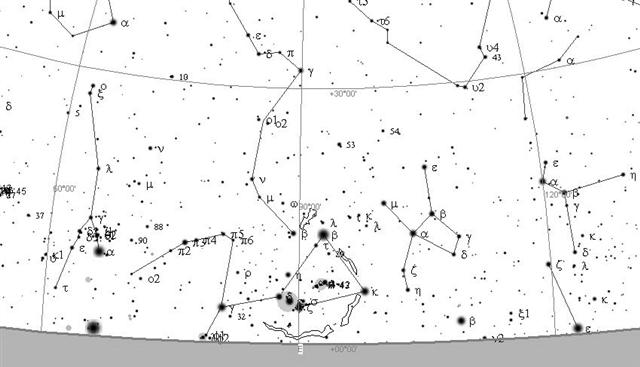Legs are for walking down
on earth whereas arms and head normally are up in the air. Rey's
alternative way to draw Virgo therefore has missed its central
meaning,
because her
left arm should go down into the earth:

The right foot of Virgo (109) came earlier than the feet of Bootes
- Hevelius has here changed his usual view from outside the
celestial globe to its interior:

The right foot of Bootes
stood on Mons Menalis - which, I suggest, could
alternatively be named the anthill or the primeval mound Ahu-one).
The 4th (unlucky) foot was below 0° and therefore out of sight in Hevelius' picture above. It was Rijl al Awwa (μ Virginis).
In the serpentine path of the Sun the quickest
and most lively places were at the equinoxes and the slowest (oldest)
at the solstices:

Observations made it clear that the quickest
development was that of the newborn, whereas old people hardly
changed at all - for them time ran like treacle. Newborn children
never reached higher than a
foot, whereas old people were comparatively tall, fully grown,
and resisting further change.
The topknot of Taranga should have been at her very top and
close to her death (†).
The feet of Virgo and Bootes should have been placed
where births (*) occurred and growth began, and beyond Spica
this situation would have corresponded to the birth place of the Sun south of the
equator, from where he would have climbed higher and higher. Similarly was the left foot of Orion
in the waters of Eridanus.

Although precession had
slowly pushed the northern spring ahead in the year
since prehistoric times. The first recorded time may have been at Gemini,
whose 3 + 1 feet could have influenced the 3 + 1 feet in Hevelius'
illustration of Virgo and
Bootes:


Probably the Mamari tablet had Ahu-one
early on side a.
| Ahu
1. Funerary monument with niches
holding the skeletons of the dead. 2. Generic term
for a grave, a tomb merely enclosed with stones. 3.
Stone platform, with or without graves. 4. Elevated
seat, throne. 5. Swollen; to swell up: ku-ahu-á
tooku va'e, my foot is swollen; ananake te
raá e-tagi-era te ûka riva mo toona matu'a ka-ahu
ahu-ró te mata, every day the daughter cried for
her parents until her eyes were quite swollen.
Vanaga.
1. To transfer, to transplant, to
take up by the roots. 2. To puff up, to swell, a
swelling, protuberance; gutu ahu, swollen
lips; ahuahu, to swell, plump, elephantiasis,
dropsy; ahuahu pupuhi, amplitude; manava
ahuahu, indigestion. 3. Paralysis. 4. A carved
god of dancing, brought forth only on rare occasions
and held of great potency. Ahuahu,
inflammation. Ahukarukaru (ahu 2 -
karukaru), dropsy. Churchill. |
|
One
One, sand. Oneone
(reduplication of oone which see below),
dirty, covered in soil, in mud. Vanaga.
Oone, ground, soil; mud;
dirty, to get dirty. Vanaga.
One, sword. (Cf. oe,
dorsal fin; àè, sword.) Ta.: óé,
sword, lance. Churchill.
Oone, sand, clay, dirt,
soil, mire, mud, muck, gravel, filth, manure, dust,
to dirty; ao oone, shovel; egu oone
vehuvehu, mud; moo te oone, shovel;
oone hekaheka, mud; puo ei oone, to daub;
kerihaga oone, husbandman; oone veriveri,
mud; oone no, muck, to dirty, to powder;
vai oone, roiled water; oone rari, marsh,
swamp; oonea, dirty T; ooneoone,
sandy; oonevai, clay T; hakaoone, to
pollute, to soil. P Mgv.: one, land in
general, earth, soil. Mq.: one, sand, beach.
Ta.: one, sand, dust, gravel. Churchill.
Miro-oone, model boat made of earth in
which the 'boat festivals' used to be celebrated. Vanaga.
... on the first day of the
year the natives dress in navy uniforms and performs exercises which
imitate the maneuvers of ships' crews ... Métraux. |
The C text does not begin at Rigel but, I
have suggested, at the Southern Cross (†)
with the carrion bird Raven - as if it was necessary to
first tell about the price to pay for a new life - a burial:
... A une certaine
saison, on amassait des vivres, on faissait fête. On
emmaillottait un corail, pierre de defunt lézard, on
l'enterrait, tanu. Cette cérémonie était un point de
départ pour beaucoup d'affaires, notamment de vacances pour le
chant des tablettes ou de la prière, tanu i te tau moko o
tana pure, enterrer la pierre sépulcrale du lézard de sa
prière ...
|
٭JULY
24 (*125) |
56 |
٭SEPTEMBER
19 |
20 (263) |
 |
 |
 |
|
Ca1-20 |
Ca4-1 |
Ca4-2 (78) |
|
10 |
December 6
(*260) |
7 |
|
71 VIRGINIS |
NODUS I
|
78 = 263 -
185 |
|
٭SEPTEMBER
21 |
22 (*185) |
23 |
24 |
25 (268) |
 |
 |
 |
 |
 |
|
Ca4-3 |
Ca4-4 |
Ca4-5 |
Ca4-6 |
Ca4-7 (83) |
|
٭SEPTEMBER
26 |
27 |
28 |
29 (*192) |
30 (273) |
 |
 |
 |
 |
 |
|
Ca4-8 |
Ca4-9 |
Ca4-10 |
Ca4-11 |
Ca4-12 (88) |
|
٭OCTOBER
1 |
 |
|
Ca4-13 |
|
kua tuu tona mea |
|
December 18 (*272) |
|
ζ
SERPENTIS, τ OPHIUCHI |
... When the man, Ulu,
returned to his wife from his visit to the temple at Puueo,
he said, 'I have heard the voice of the noble Mo'o, and
he has told me that tonight, as soon as darkness draws over the
sea and the fires of the volcano goddess, Pele, light the
clouds over the crater of Mount
Kilauea, the black cloth will cover my head ...
... the breadfruit
originated from the sacrifice of the war god Ku. After
deciding to live secretly among mortals as a farmer, Ku
married and had children. He and his family lived happily until
a famine seized their island. When he could no longer bear to
watch his children suffer, Ku told his wife that he could
deliver them from starvation, but to do so he would have to
leave them. Reluctantly, she agreed, and at her word, Ku
descended into the ground right where he had stood until only
the top of his head was visible. His family waited around the
spot he had last been, day and night watering it with their
tears until suddenly a small green shoot appeared where Ku
had stood. Quickly, the shoot grew into a tall and leafy tree
that was laden with heavy breadfruits that Ku's family
and neighbours gratefully ate, joyfully saved from starvation
...
... The moai as Sky
Propper would have elevated Sky and held it separate from
Earth, balancing it only upon his sacred head. This action
allowed the light to enter the world and made the land
fertile. Increasing the height of the statues, as the
Rapa Nui clearly did over time, would symbolically
increase the space between Sky and Earth, ensuring increased
fertility and the greater production of food. The
proliferating image, consciously or unconsciously, must have
visually (and reassuringly) filled the dangerously empty
horizon between sea and land, just as the trees they were so
inexorably felling once had ...
On Easter Island, south of the equator, October 1
(273 + 1) was comparable to April 1 (90 + 1) north
of the equator. 274 - 91 = 183. Rakau in Ca4-13 (where we
can read 413 = 7 * 59) could well have been commented upon as kua
tuu tona mea - given that Metoro saw this date rather than
December 18.
|
Tuu
1. To stand erect. 2. Mast, pillar, post.
Van Tilburg.
1. To stand erect, mast, pillar, post;
tuu noa, perpendicular; tanu ki te tuu, to
set a post; hakatu tuu, to step a mast; tuu
hakamate tagata, gallows; hakatuu, to erect,
to establish, to inactivate, to form, immobile, to set
up, to raise. P Mgv., Mq., Ta.: tu, to stand up.
2. To exist, to be. Mgv.: tu, life, being,
existence. 3. To accost, to hail; tuu mai te vaka,
to hail the canoe. Mgv.: tu, a cry, a shout. 4.
To rejoin; tuua to be reunited. 5. Hakatuu,
example, mode, fashion, model, method, measure, to
number. PS Sa.: tu, custom, habit. Fu.: tuu,
to follow the example of. 6. Hakatuu, to
disapprove; hakatuu riri, to conciliate, to
appease wrath. 7. Hakatuu, to presage,
prognostic, test. 8. Hakatuu, to taste. 9.
Hakatuu, to mark, index, emblem, seal, sign, symbol,
trace, vestige, aim; hakatuu ta, signature;
akatuu, symptom; hakatuua, spot, mark;
hakatuhaga, mark; hakatuutuu, demarcation.
Churchill.
1. To arrive: tu'u-mai. 2.
Upright pole; to stand upright (also: tutu'u). 3.
To guess correctly, to work out (the meaning of a word)
correctly: ku-tu'u-á koe ki te vânaga, you have
guessed correctly [the meaning of] the word. 4. To hit
the mark, to connect (a blow). 5. Ku-tu'u pehé,
is considered as... ; te poki to'o i te me'e hakarere
i roto i te hare, ku-tu'u-á pehé poki ra'ura'u, a
child who takes things that have been left in the house
is considered as a petty thief. Tu'u aro,
northwest and west side of the island. Tu'u haígoígo,
back tattoo. Tu'u haviki, easily angered person.Tu'u-toga,
eel-fishing using a line weighted with stones and a hook
with bait, so that the line reaches vertically straight
to the bottom of the sea. Tu'utu'u, to hit the
mark time and again. Tu'utu'u îka, fish fin
(except the tail fin, called hiku). Vanaga.
... To the Polynesian and to the
Melanesian has come no concept of bare existence; he
sees no need to say of himself 'I am', always 'I am
doing', 'I am suffering'. It is hard for the stranger of
alien culture to relinquish his nude idea of existence
and to adopt the island idea; it is far more difficult
to acquire the feeling of the language and to accomplish
elegance in the diction under these unfamiliar
conditions. Take for an illustrative example these two
sentences from the Viti: Sa tiko na tamata e kila:
there are (sit) men who know. Sa tu mai vale na yau:
the goods are (stand) in the house. The use of tu
for tiko and of tiko for tu would
not produce incomprehensibility, but it would entail a
loss of finish in diction, it would stamp the speaker as
vulgar, as a white man ... Savage life is far too
complex; it is only in rich civilization that we can
rise to the simplicity of elemental concepts ...
Churchill 2. |
Although my argumentation assumes mea was referring to
something well known and at the beginning of the year. The
Moriori fishermen on Chatham Islands had used the Rigel year
and in their creation myth there was a mea (memea)
which stood up:
...
In view of the
almost universal prevalence of the Pleiades year throughout the
Polynesian area it is surprising to find that in the South
Island and certain parts of the North Island of New Zealand and
in the neighboring Chatham Islands, the year began with the new
Moon after the early morning rising, not of the Pleiades, but of
the star Rigel in Orion
...

... Rangitokona,
prop up the heaven! // Rangitokona, prop up the morning!
// The pillar stands in the empty space.
The thought [memea]
stands in the earth-world - // Thought stands also in the sky.
The kahi
stands in the earth-world - // Kahi stands also in the
sky.
The pillar stands,
the pillar - // It ever stands, the pillar of the sky.
Then for the first
time was there light between the Sky and the Earth; the world
existed ...
"The version was collected around 1869 by the
Chatham Islands shepherd Alexander Shand from Hirawanu Tapu,
a true Moriori (indigenous Chatham Islander). He, however, had
grown up as a slave of invading Taraniki Maoris who had
commandeered a whaler and 'conquered' the islands in 1835.
He only spoke Maori. In consequence he could not
put the stories down in the Moriori dialect; nor could he nor
anyone explain certain words in the first chant. In order to
complete it I have ventured to translate 'memea' as 'thought'
(its Rarotongan meaning), leaving 'kahi' unattempted."

|
Mea
1. Tonsil, gill (of fish). 2. Red
(probably because it is the colour of gills); light red,
rose; also meamea. 3. To grow or to exist in
abundance in a place or around a place: ku-mea-á te
maîka, bananas grow in abundance (in this place);
ku-mea-á te ka, there is plenty of fish (in a
stretch of the coast or the sea); ku-mea-á te tai,
the tide is low and the sea completely calm (good for
fishing); mau mea, abundance. Vanaga.
1. Red;
ata mea, the
dawn. Meamea,
red, ruddy, rubricund, scarlet, vermilion, yellow;
ariga meamea,
florid; kahu meamea
purple; moni meamea,
gold; hanuanua meamea,
rainbow; pua ei meamea,
to make yellow.
Hakameamea, to redden, to make yellow. PS
Ta.: mea,
red. Sa.: memea,
yellowish brown, sere. To.:
memea, drab. Fu.:
mea, blond,
yellowish, red, chestnut. 2. A thing, an object,
elements (mee);
e mea,
circumstance; mea ke,
differently, excepted, save, but;
ra mea, to
belong; mea rakerake,
assault; ko mea,
such a one; a mea nei,
this; a mea ka,
during; a mea,
then; no te mea,
because, since, seeing that;
na te mea,
since; a mea era,
that; ko mea tera,
however, but. Hakamea,
to prepare, to make ready. P Pau., Mgv., Mq., Ta.:
mea, a thing.
3. In order that, for. Mgv.:
mea, because,
on account of, seeing that, since. Mq.:
mea, for. 4.
An individual; tagata
mea, tagata
mee, an individual. Mgv.:
mea, an
individual, such a one. Mq., Ta.:
mea, such a
one. 5. Necessary, urgent;
e mea ka, must
needs be, necessary; e
mea, urgent. 6. Manners, customs. 7. Mgv.:
ako-mea, a
red fish. 8. Ta.: mea,
to do. Mq.: mea,
id. Sa.: mea,
id. Mao.: mea,
id. Churchill. |

|
















